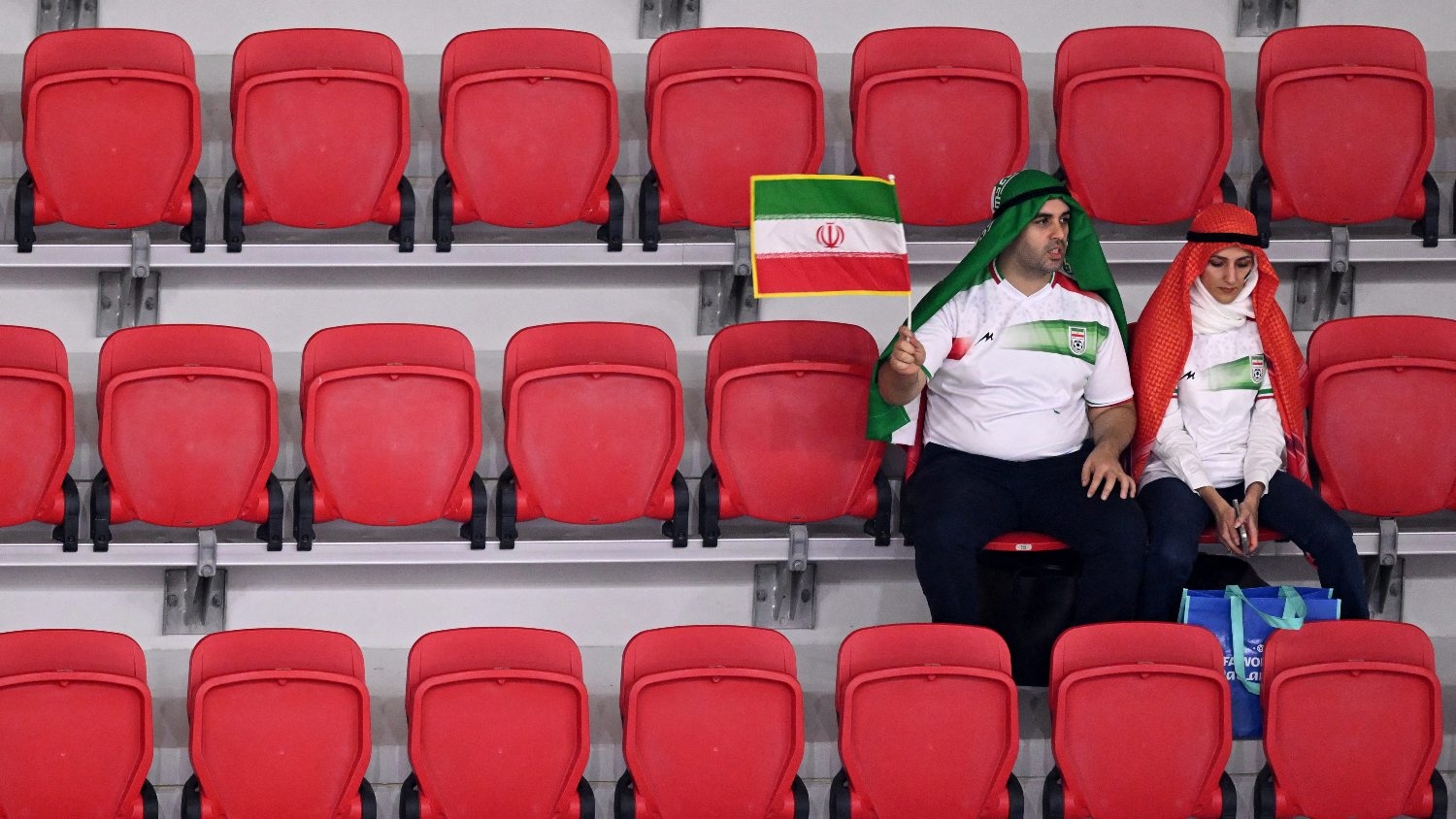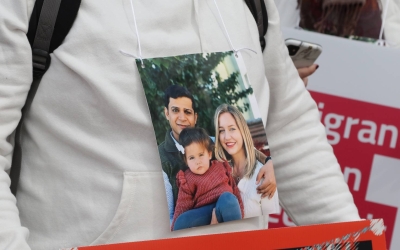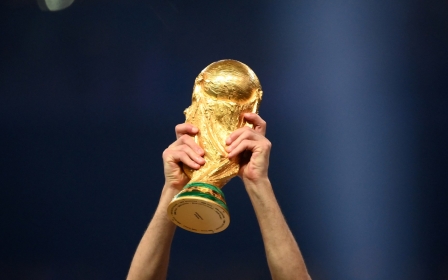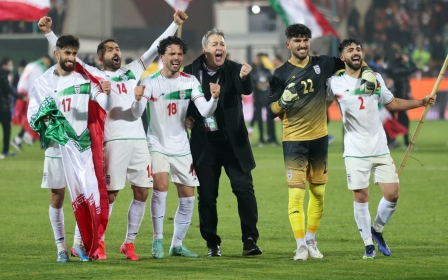World Cup 2026: Iranians fear US visa restrictions will shut them out

Iranian football fans fear visa restrictions imposed by successive United States administrations could prevent them from attending the 2026 World Cup.
In 2018 the US won the bid to host the next tournament alongside Canada and Mexico, but the decision has faced renewed criticism following the recent Qatar World Cup.
Several Iranian nationals told Middle East Eye the decades-long diplomatic dispute that had forced them to travel to neighbouring countries for their visa applications was untenable, given the depreciating Iranian rial and exorbitant costs associated with travel.
Due to the lack of diplomatic relations between the US and Iran since the Iranian revolution of 1979, Iranians have had to travel to a third country to get a US visa.
While the Swiss embassy's foreign interests section provides consular services to US citizens living in or travelling to the Islamic Republic, this service is not afforded to Iranian citizens.
New MEE newsletter: Jerusalem Dispatch
Sign up to get the latest insights and analysis on Israel-Palestine, alongside Turkey Unpacked and other MEE newsletters
'It has been over four months ... and our case is still in 'administrative processing''
- Kimia, Tehran resident
Kimia, a 23-year-old Tehran resident who refused to give her last name because her family's visa was still being processed, said she had been waiting several months for a response after forking over thousands of dollars and travelling to a neighbouring country for a visa interview.
She told MEE it was a logistical nightmare, with mostly affluent Iranians being able to travel to either Turkey, Armenia or the United Arab Emirates where US embassies are staffed with Farsi-speaking consular officers.
With nearly a third of Iranians living below the poverty line, most Iranians, especially football fans, would not be able to afford to spend a week in Dubai, waiting for their visas to be processed.
"It's been over four months since I attended my US visa interview, and our case is still in 'administrative processing'," she said.
"They do not give you any final answer. They don't approve or reject your visa application and don’t even explain why your visa had not been approved immediately. That puts your life in limbo, as you don’t know how to make plans for your future."
Ban of IRGC conscripts
Shortly after winning the 2026 bid, former US President Donald Trump promised to expedite visas for the World Cup in a series of letters his administration sent to Fifa. But Iranians have repeatedly criticised restrictions imposed by successive US administrations since the start of the "war on terror".
Since the Trump administration's decision to designate the Islamic Revolutionary Guard Corps (IRGC) as a foreign terrorist organisation (FTO) in 2019, many Iranian applicants have been denied entry because of mandatory military service in the IRGC.
The restrictions have been widely criticised by former Iranian conscripts and their families who have been separated because of the ban. There have also been other restrictions which have prevented Iranian wrestlers from competing in the US and Iranian archers from taking part in the 2022 World Games and potentially winning medals.
"Following Trump's 2019 executive order, many people like me were denied entry despite having visited the country earlier," Amir Abolhassani, a Canada-based bioprocess engineer and Iranian social activist, told MEE.
"The ban also affected my wife and children, putting them on a list developed by the US Border Protection which denies them entry into the US and Mexico."
Abolhassani, a former IRGC draftee who has been actively campaigning on social media for the lifting of the ban, says draftees and their families are regularly interrogated and kept at international airports for hours, and even mistreated by authorities when visiting Canada or any other US-allied country.
One recent case was that of Elham Nasrollahi, an Iranian-American physician living in northern Virginia who has spent the last several years in a state of uncertainty, as her husband has been denied entry into the US because of his mandatory military service in Iran.
"As a US citizen, I expected that bringing my spouse wasn't going to be an issue for me. However, I was very wrong," Nasrollahi told MEE.
"Emotionally, I have been a wreck. This is like the worst thing that could ever happen to a couple."
In February, Nasrollahi and many other family members of former IRGC conscripts stood side-by-side, facing the White House, holding posters and banners reading "Iranian Americans are not political pawns". The demonstrators called on the US administration to separate the IRGC draftees from IRGC members in visa applications.
"We do not want IRGC to be removed from the list. We think the Biden administration implemented the law improperly. INA212(A)(3)(B) is expected to target IRGC staff, not innocent ordinary draftees who had no choice but to serve their mandatory conscription. The administration now punishes victims instead of human-rights violators and terrorists," an Iranian user tweeted in June.
Abolhassani says the travel ban against former IRGC conscripts and their families has not only created trouble for their lives and ruined their job opportunities but has in some cases deprived them of the chance to receive medical treatment or see their loved ones for a last time before death.
"We had a valid invitation from our employer in the US. It is unfair that a person’s destiny and even that of his/her future generations all depend on the decision of a single visa officer after a short interview, and in most cases, there is no other chance available for the rejected applicant," Kimia told MEE.
The State Department didn't answer MEE's questions, instead, a spokesperson said: "All visa applications are adjudicated on a case-by-case basis."
"We cannot speculate on whether someone may or may not be eligible for a visa. Whenever an individual applies for a US visa, a consular officer reviews the facts of the case and determines whether the applicant is eligible for that visa based on US law."
US, Canada 'refuse to listen'
The travel ban against former IRGC conscripts has even affected celebrities like famous Iranian vocalist Alireza Ghorbani, a legal resident of Canada, preventing him from entering the US to perform at a sold-out celebration of the Iranian New Year (March 2022) in California, where a huge population of Iranian expatriates live.
The headliner was detained and interrogated in an airport in Toronto before being denied entry into the US.
The fact that a renowned Iranian celebrity like Ghorbani is treated this way clearly shows what Iranian football fans will be going through if they plan to travel to North America for the 2026 Fifa World Cup.
And that will not be limited to the US, as Canada has also subjected former IRGC draftees and their families to "a secondary screening involving long, intrusive interviews and an extensive search of their belongings, cellphones and social media," according to a recent report by CBC.
"It seems that Canada is following the US' suit and is preventing former IRGC draftees from entering the country," Abolhassani told MEE, adding that Canadian authorities are "considering former conscripts as members of the Revolutionary Guard, while it is far from reality".
"Former IRGC conscripts have only received the basic military training at the beginning of their mandatory service. In many cases like university professors, elite students and doctors, they have not even received that much training," he added. "While the US and Canada have welcomed the Islamic Republic’s authorities and their children, they refuse to listen to our requests."
Even though Iranian football players will not be alone in the stadiums of North America where millions of Iranians already live, many Iranian fans will have to watch Team Melli’s matches at home unless the governments of the US and Canada relax the restrictions in the run-up to the World Cup.
MEE reached out to Fifa the Iranian Football Federation, and the Iranian foreign ministry for comment, but did not receive a response by the time of publication.
Middle East Eye delivers independent and unrivalled coverage and analysis of the Middle East, North Africa and beyond. To learn more about republishing this content and the associated fees, please fill out this form. More about MEE can be found here.





